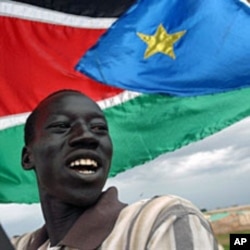Talks between north and south Sudan on the fate of the strategic Abyei border region have ended without agreement, casting doubt on the south's January independence referendum. Frantic diplomatic efforts are on to salvage the 2005 peace agreement that ended Sudan's 20 year civil war.
Sudan's Vice-President Ali Osman Taha flew from Khartoum to the southern capital, Juba Tuesday for urgent talks with South Sudan President Salva Kir. The hastily-arranged meeting came after the southern delegation walked out of U.S.-mediated negotiations with the Khartoum government over the Abyei region.
A joint statement issued by the two sides after the breakdown blamed the failure on a dispute over who would be eligible to vote in a scheduled referendum on whether oil-rich Abyei would become part of the north or the south in the likely event the south votes to secede in January. The statement said negotiators would meet again in Addis Ababa at the end of this month.
As he left the talks, Southern People's Liberation Front Secretary General Pagan Amum accused northern negotiators of threatening Sudan's fragile peace by demanding the inclusion of large numbers of northern-allied nomads of the Misseriyah tribe on Abyei's voter rolls.
"These talks have failed to reach any agreement, unfortunately, because the National Congress Party came with a fresh new claim that Abyei belongs to the north and belonged to the Misseriya people," he said.
Amum tells VOA that with south Sudan's January 9 independence referendum fast approaching, failure to settle the Abyei issue could plunge the country back into war.
"We are left with 90 days, the time is very critical, and if the parties fail to sort out these issues, this could lead to an end of the peace process itself and the peace may unravel in the Sudan," said Amum.
With the talks on a referendum seemingly deadlocked, diplomats speaking privately say the focus of the past few days has been on a U.S. proposal to bypass the Abyei vote completely. The proposal would require an advance agreement to settle the controversial citizenship and border issues.
The idea is said to have drawn interest from both sides.
Northern negotiating team leader Salah Abdallah Mohammed Ghosh said the delegations are being asked to 'think outside the box' (seek unconventional solutions) to find a way around a potentially disastrous referendum.
"We, the SPLM, and the mediators feel the referendum may face some problems and we are trying to overcome those problems, and we also tackle the issue of Abyei to think of new ideas," said Gosh. "Those new ideas may be more suitable so as to solve the issue of Abyei without going to referendum, but this will be tackled in the coming meeting in Addis by the end of October."
Mohammed Ghosh expressed confidence that, with time running out, the next round of talks would be decisive.
"We believe the two parties will agree not to go back to war, and we as Congress Party will not go back to war. We believe we have to tackle and solve all issues peacefully and positively," he said.
Diplomats say the next round of talks will be stepped up a notch. Vice-President Taha is due in Addis Ababa to lead the government delegation, while SPLM President Kir will represent the south.
The U.S. mediation team will also attend, led by President Barack Obama's special envoy Scott Gration. But it will be joined by an African Union team led by special envoy, former South African president Thabo Mbeki, taking over as chairman.





